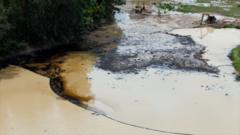Colombian energy giant Ecopetrol is under fire following revelations from a whistleblower who disclosed a trove of documents detailing extensive oil spills and environmental negligence. According to a report by the BBC World Service, data from this former employee shows that over 800 pollution incidents occurred during a nearly thirty-year period between 1989 and 2018, with a substantial number of these incidents going unreported by the company.
The whistleblower, Andrés Olarte, who worked as an adviser to the CEO, noted that when he raised concerns about the “awful” pollution data, he was met with resistance and dismissal from management. After leaving the company in 2019, Olarte took his findings to the Environmental Investigation Agency and the BBC, leading to the unraveling of Ecopetrol’s environmental record.
Local communities near Ecopetrol’s main refinery located in Barrancabermeja, along the banks of the Magdalena River, have reported dire effects on wildlife due to oil pollution. Fishermen have revealed that fish caught in the river emit a foul smell resembling crude oil, with alarming signs of contamination visible in the water. Yuly Velásquez, a local fisherwoman, described an appalling situation where endangered species were found dead in the vicinity of oil pipelines, raising concerns over the health of biological diversity in one of the world's richest ecosystems.
Ecopetrol claims to adhere to Colombian laws and insists that it employs leading sustainability practices. However, leaked data suggests that a substantial number of unresolved environmental impacts were hidden from authorities. In a statement to the BBC, Felipe Bayón, the company's CEO from 2017 to 2023, denied any attempts to cover up pollution incidents and attributed many spills to acts of sabotage from illegal armed groups.
Environmental authorities have also reported hundreds of oil spills annually since 2020, indicating that pollution remains a pressing issue in the Barrancabermeja area. Fisherwoman Velásquez stated that research had shown an escalating number of dead animals due to pollution, a stark warning sign of the environmental crisis affecting their livelihoods.
Despite the threats made against Olarte and Velásquez—both of whom have faced intimidation for raising environmental concerns—both individuals remain committed to advocating for their community and the environment. Colombia's climate defenders continue to face a dangerous landscape, with the nation being cited as the most perilous for environmental activism globally.
As the situation unfolds, the accountability of Ecopetrol and the desperate need for action against environmental degradation have never been more crucial. The whistleblower’s revelations shine a critical light on the intersection of corporate responsibility, environmental justice, and community well-being in Colombia.





















